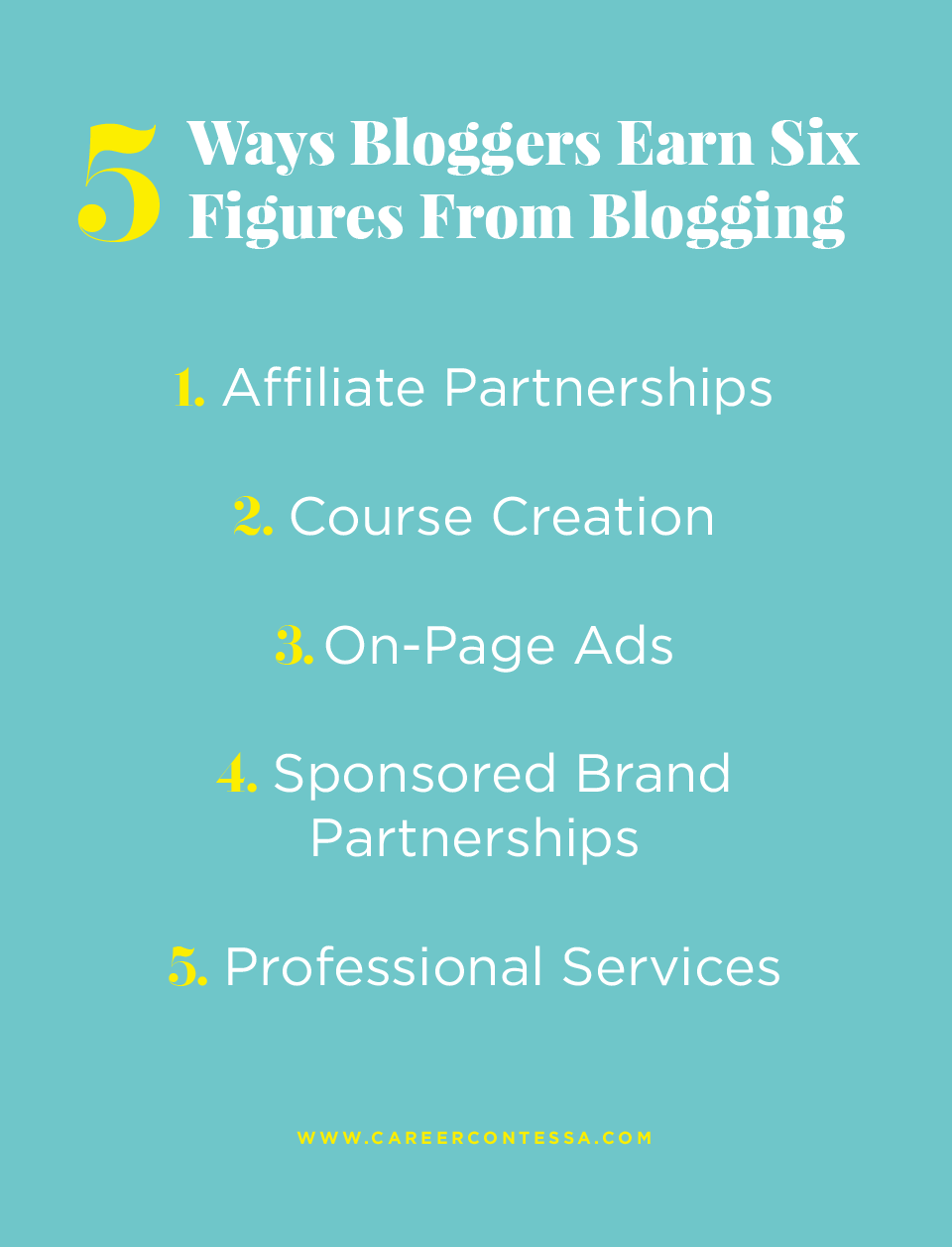Could this title be any more bloggier?
If you search the term “blogging is dead” you'll find a multitude of opinions on the matter. Some say that yes, definitively, the blog is dead, buried, kaput, and no more. Others will say, absolutely not, the blog is alive and better than ever.
We fall in the middle on this matter. Of course, the blog is alive and well—heck,
we are sort of a blog. However. blogging has evolved and morphed over the years. While your LiveJournal might be completely dead (I sure hope mine is) the blog certainly is not.
In fact, many bloggers make serious money doing just that—blogging. Yes, in the year 2021 bloggers can make some serious cash by blogging, but how?
This article isn’t meant to encourage you to
quit your job and
start a blog. Rather, it’s an exploration in the creative ways bloggers use different ways to monetize their content. I wanted to write this article to
dispel the rumors that you can make 100K tomorrow by implementing a single strategy. You can't and you won't.
But, if you do, email me. I want whatever you're having.
Blogging Isn’t Easy
Unlike your LiveJournal, Xenga, or your old Geocities website, blogs are no longer a place to unload your miscellaneous thoughts and feelings. Instead, blogging has transformed into a serious revenue stream for even the biggest corporations. I mean,
Google has a blog.
But
blogging isn’t easy. The most successful bloggers will tell you that—over and over again. Blogs take time, consistency, dedication, attention to data, and a devotion to your growing audience.
I'm not here to tell you how to start a blog, but these are (what I consider to be) the pillars of a successful blog—one that could potentially earn revenue.
- A dedicated niche: Write about what you know. Think about the pain points you encountered in getting to your level of knowledge. Write about it. Teach your readers through your content. Here’s the thing. No niche is too small! If you want to blog about trimming Bonsai trees, do it. Become the Bonsai expert on the internet.
- Unique voice: We’re not all reading long scientific papers for a reason—they’re often difficult to ingest and filled with clunky jargon we don’t understand. Blogging is like taking a 100-page scientific study and translating it into bite-sized, understandable prose. When you use your unique voice to disseminate interesting content, you’ll be more likely to grow a rapt audience.
- Consistent content: Consistency is key when it comes to blogging. When starting out your blog, create a content schedule—and stick to it. I’m not here to tell you that you need to blog 10x a week, but if you commit to publishing on Monday, Wednesday, and Friday, then do that.
This isn’t easy. It takes time and dedication. Bloggers who make a full salary through their content are usually doing this work as their full-time job.
How Do Top Bloggers Make Money Blogging?
The most successful bloggers have found a way to turn their hobby of writing about a specific niche into a profitable business. Some bloggers were early adopters, some started years before “blogging” was “a thing”—and many work tirelessly to stay up-to-date with the latest and greatest blogging practices. Here's the thing—no blogger is making effortless revenue solely through writing 500 words and pushing publish.
Bloggers are constantly diversifying their revenue streams, analyzing data, and hustling to keep up with the times in order to earn money.
I wanted to take a look at some bloggers who earn a (pretty hefty) salary through blogging—and here is what I found:
Affiliate Partnerships
Affiliate partnerships are a popular way for bloggers to earn income—by recommending some of their favorite products and brands while earning a commission for purchases made from their blog.
For example,
Amazon’s affiliate marketing program is one of the largest in the world. With millions (and millions) of products available for sale, Amazon’s affiliate program can be used by bloggers in almost any niche to recommend helpful products.
Oher popular affiliate platforms include:
How to Do it
To enter an affiliate partnership, a blogger needs to meet certain criteria and requirements which differ from platform to platform. Typically, a blogger will need an established audience in order to be accepted into affiliate programs. As with earning any sponsored or affiliate revenue on a blog, the blogger must add a disclaimer that affiliate money may be earned from purchases.
Who’s Doing it
Some bloggers report earning a large amount from affiliate marketing. For example, former CPA Lena of
What Mommy Does, reports earning up to $7,495 per month using affiliate programs like
Bluehost,
Amazon Associates, and
StudioPress. As a CPA turned stay-at-home-mom, Lena had focused her blog on family finances and financial literacy.
Course Creation
Online courses are increasingly popular, especially in COVID-19 era. Course creation is a great way to monetize your deep (and actionable) expertise on a subject for your captive audience.
If your blog is in a skills-based niche, like data science or UX design, you might be able to create and sell a course that teaches in-demand skills.
Many blogger choose to create digital content, like courses, because the overhead cost is not as high as a physical product would be and the courses are typically deeper dives into the free content they’re already serving. Translation: their current audience is already interested and ostensibly prepped to buy.
How to Do It
If you’re going to create a course, you better have lots of unique knowledge to share. If that’s the case, get to writing. Start with a curriculum, create lesson plans, and use a course platform to help you host and sell your platform.
Some course creation platforms include:
Who’s Doing It
Well, hello there.
Yes, if you didn’t already know, we create
courses here at Career Contessa. Here’s why. Lauren McGoodwin started Career Contessa as a helpful resource built inclusively for women in the workplace. While we love creating more “bite-sized” content in the form of (hello!) blog articles or
downloadable resources, there were subjects we wanted to do deeper dives on—like management or career transitions.
Another blogger,
Eden Fried, also creates and sells courses about monetizing your blog—with insights into everything from affiliate marketing to converting email leads into customers.
DISPLAY Ads
This is a strategy that many bloggers use as a gateway to start making passive income. What’s more passive than letting display ads run on your page only to receive a check in the mail later on?
They may not always be pretty, but this is a great way for a blogger with good traffic to make money. Consider partnering with an ad service to serve ads to the audience consuming your (free!) blog content.
How to Do it
The tricky thing about using display ads is that it takes a large audience to make a decent income from it. However, bloggers use ad graphics in sidebars, headers, footers, and within content in order to generate revenue.
A few platforms to help you get display ads are:
Who’s Doing It
In short, many people. Display ads are a great way to plug and play passive income—and it’s a great way for a blogger to generate some of the most reliable income.
Food blogger Jamie Silva of
A Sassy Spoon detailed exactly
how she earned $100K in 2019, largely due to ad income. This is a must-read for anyone looking for a real deal account of making money through a blog—complete with Google Analytics screenshots!
Sponsored Brand Partnerships
We’re no strangers to the #ad hashtag on an Instagram post. Sponsored brand partnerships are a great way to connect with a brand that authentically resonates with your existing audience.
Readers are fatigued by your old-school disruptive advertising. Sponsored brand partnerships act like old school printed magazine advertorials, where a review or article about products or services seamlessly fits into the overall content of the blog.
Bloggers may reach out to brands to offer a sponsored review or a sponsored post that mentions the product. Sometimes, brands will use influencer agencies to act as a resource to connect with influencers. Bloggers would do well to pay attention to brands that often sponsor blog content and the influencer agencies who broker these deals regularly.
If You Can Blog It, You Can Pod It, Too
Some bloggers also transform their blogs into audio content. Yep, you guessed it! The blogger-podcaster is a pretty common double threat these days. Services like
Anchor make it easy for anyone to dip their toe into podcasting, too. No network, costly equipment, or studio necessary.
Anchor allows any burgeoning podcaster to create, distribute, and monetize their podcast from any device, for free.
Who’s Doing It
Professional Services
Are you a seasoned copywriter or a skilled web designer? Using your blog to create free content around your niche will attract visitors. From there, you may offer your services on a consultant or freelance basis. According to a
study by DataBadger, 45 percent of bloggers who earn over $50,000 per year sell their own product or service.
Professional services and blogging can go hand-in-hand—and they often amplify one another. If you have a business in 2021, you should probably have a blog, too.
How to Do It
Some bloggers take the opposite route—by creating a blog first, then adding professional services to it. The first step to adding professional services as a revenue stream is to—you guessed it—blog about it! Let your readers know you are now offering 1:1 professional services.
From there, continue to create content around your niche—and all the pain points that come with it. When your service addresses these pain points, include a call to action for readers to enlist your professional services.
Who’s Doing It
Marketing expert
Neil Patel uses his blog to offer his consulting services, among many other helpful training modules and free tools. In
this article, Patel details how he took his blog (over ten years ago!) and turned it into a business.












